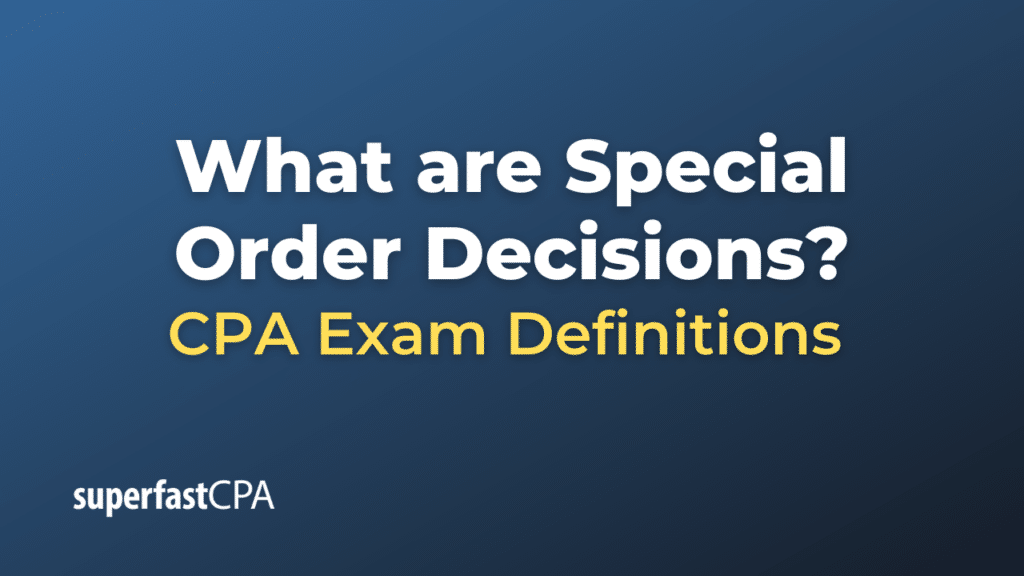Special Order Decisions
Special order decisions refer to the choices companies face when offered a one-time order that’s different from their regular orders. These decisions require management to evaluate whether to accept or reject the order based on various financial and non-financial factors.
Special order decisions typically involve the following considerations:
- Variable Costs: One of the primary factors to consider is the variable cost of the order. It’s crucial to ensure that the selling price of the special order covers the variable costs associated with producing the goods.
- Excess Capacity: If a company is already operating at full capacity, accepting the special order might mean forgoing some regular orders. On the other hand, if there is idle capacity, the company could produce the special order without affecting its regular operations.
- Contribution Margin: Even if the special order’s selling price is lower than the regular selling price, it might still provide a positive contribution margin (selling price minus variable costs). If this contribution margin helps in covering fixed costs, the order might be worth considering.
- Opportunity Costs: Management should consider what other opportunities they might be giving up by accepting this special order. If there’s another, more profitable use for the company’s resources, it might be better to decline the special order.
- Non-financial Considerations: These might include the potential for future business with the customer, the strategic implications of the order, or potential effects on the company’s reputation.
- Effect on Regular Pricing: Accepting special orders at a lower price might set a precedent or send the wrong signal to other customers, potentially leading them to expect similar discounts.
- Contractual and Production Limitations: Sometimes, there might be contractual limitations with other parties or production constraints that can affect the decision to accept a special order.
Example of Special Order Decisions
Let’s walk through a more detailed example to understand special order decisions:
Crafted Furniture Co. typically produces high-quality wooden chairs sold to retailers at $150 per chair. The variable cost to produce each chair is $90. The fixed costs (like rent, salaries, and utilities) spread over the usual production are $30 per chair. Therefore, their regular profit margin per chair is $30 ($150 – $90 – $30).
Crafted Furniture Co. is currently operating at 70% of its production capacity.
A new online furniture retailer, WebDecor, approaches Crafted Furniture Co. with a special order. They request 500 chairs but at a discounted price of $110 per chair due to the bulk order. Additionally, WebDecor has specific branding requirements, so these chairs will be stamped with WebDecor’s logo.
Analysis:
- Special Order Pricing:
- Selling price per chair for the special order: $110
- Variable cost remains at $90 per chair.
- Contribution margin from special order: $20 per chair ($110 – $90)
- Capacity Check:
- Crafted Furniture Co. is only utilizing 70% of its production capacity, implying they have sufficient capacity to produce the extra 500 chairs without incurring additional fixed costs.
- Total Contribution from Special Order:
- For 500 chairs, the company would earn a total contribution of $10,000 ($20 x 500) toward covering fixed costs and profit.
Decision Factors:
- Profitability: The special order provides a reduced profit of $20 per chair instead of the regular $30. However, considering the unused capacity and the total contribution of $10,000, it seems favorable.
- Potential Future Business: Accepting this order could establish a business relationship with WebDecor, potentially leading to more orders in the future.
- Impact on Regular Sales: Since these chairs are specifically branded for WebDecor, there’s a low risk of cannibalizing regular sales or upsetting existing customers with the discounted rate.
- Opportunity Cost: No other prospective orders are on the horizon that promise a higher profit margin, making the special order a good use of the idle capacity.
Based on the analysis and decision factors, Crafted Furniture Co. might decide to accept the special order from WebDecor. Despite the reduced profit per chair, the order offers a significant overall contribution, makes good use of the idle capacity, and opens up potential future business opportunities.













